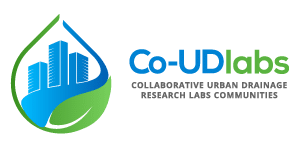A program of collaborative activities will engage the EU urban drainage sector to exchange knowledge, collaboratively generate and encourage innovation and enable multiple avenues of research:
- The role of RI to support a more rapid transition to smart and sustainable UDS management will be addressed with data collection and analysis performed with groups of policy makers, water utilities, scientists and water innovators needs. Open multi-sectorial groups will be launched in Special workshops at key Urban Drainage conferences and meetings, such as NOVATECH 2023.
- An efficient, harmonised and curated means of access to the data collected under the project will be created. Data standardization, validation and interoperation protocols, will be available for Co-UDlabs users Urban Drainage community. Smart governance practices, public access to data and training and empowering of project users and beneficiaries will be boosted during the project lifetime.
- Co-UDlabs outcomes will be disseminated to a wide range of relevant stakeholders and to society through a series of dissemination activities.
WP1 NA1
Sectorial Integration and Sustainability Strategy
WP1 will develop the knowledge and propose working methods to promote the long-term sustainability and impact of the Co-UDlabs Integrated Action on the EU UDS community. The WP activities will aim to map the RIs existing and potential users’ and community needs from UDS, promote and then promote consensus on how to use common research infrastructure and develop practices to enhance the implementation of relevant EU environmental, economic and societal policies. WP1 will interact with all other WPs to ensure effective knowledge feedback from the different NA, TA and JRA activities to all the WP1 deliverables.
WP2 NA2
Harmonization and Capacity building
This WP includes internally-oriented activities to ensure interoperability such as harmonization and an overarching data management system, considering such issues as data formats, validation etc. and externally-oriented activities to foster smart governance and policy as well as public access to data.
The first group of activities focuses on harmonization of experimental standards in the research infrastructures (Task 2.1) and capacity building among the different partners of the Co-UDlabs network (Task 2.2)
The second group of activities will build on these results to develop new and open standards and protocols for policy-makers, utility managers and other stakeholders of the urban drainage community (Task 2.3).
WP3 NA3
Training Activities
The development of training activities within Co-UDlabs will enhance the transfer of knowledge between the academic world and other sectors of the value chain. Activities in this WP are partly based on existing events and collaborations involving the project partners: Co-UDlabs will give them more visibility and attractivity and will reinforce the European networking and collaborations. On-site training activities have been designed for early-stage researchers (Task 3.1) and industry and UDS practitioners (Task 3.2). UDS professionals training events will be held at the unique facilities offered by Co-UDlabs as TA, favoring the incorporation of future users into the proposal. On-line training activities are offered under Task 3.3.
WP4 NA4
Communication, dissemination and exploitation of results
WP4 will increase the impact of Co-UDlabs research for targeted end-users across industry, water utilities, policy makers, academia and the wider public. A set of clustering activities involving water utilities, practitioners and end-user will be promoted at national level with specific project information packages in different languages to increase the impact of dissemination activities. Co-UDlabs is a multi-lingual consortium and language barriers for non-scientific UD communities will be addressed at national level events with practitioners, water utilities and regulators.
All publications and data-sets that result from Co-UDlabs will be fully open access to raise awareness of the work of Co-UDlabs and the importance of urban drainage systems to the wider public.
WP5 NA5
Management of the TA
The main objective of WP5 is the organization and management of the trans-national access of external user groups in a single-entry point. It includes the development of calls, engagement activities to create multi-sectorial facility users groups, the support to the users, the evaluation and selection of access projects, and the development of the users stay rules.
